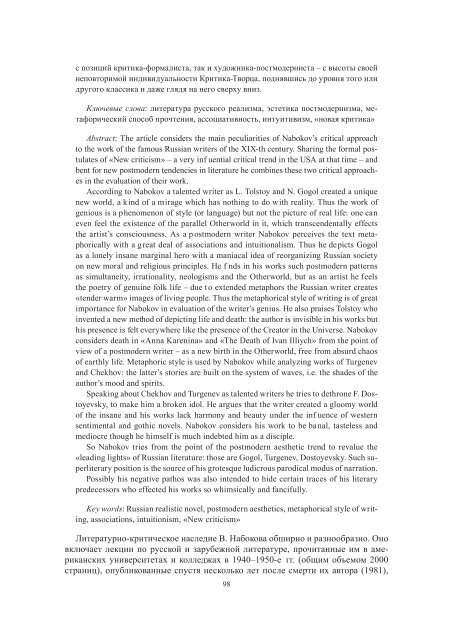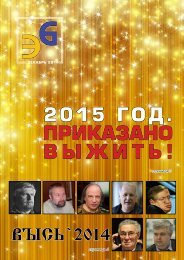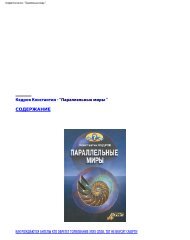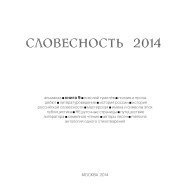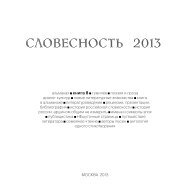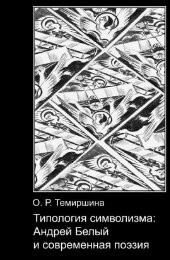STEPHANOS
2015_14
2015_14
You also want an ePaper? Increase the reach of your titles
YUMPU automatically turns print PDFs into web optimized ePapers that Google loves.
с позиций критика-формалиста, так и художника-постмодерниста – с высоты своей<br />
неповторимой индивидуальности Критика-Творца, поднявшись до уровня того или<br />
другого классика и даже глядя на него сверху вниз.<br />
Ключевые слова: литература русского реализма, эстетика постмодернизма, метафорический<br />
способ прочтения, ассоциативность, интуитивизм, «новая критика»<br />
Abstract: The article considers the main peculiarities of Nabokov’s critical approach<br />
to the work of the famous Russian writers of the XIX-th century. Sharing the formal postulates<br />
of «New criticism» – a very inf uential critical trend in the USA at that time – and<br />
bent for new postmodern tendencies in literature he combines these two critical approaches<br />
in the evaluation of their work.<br />
According to Nabokov a talented writer as L. Tolstoy and N. Gogol created a unique<br />
new world, a kind of a mirage which has nothing to do with reality. Thus the work of<br />
genious is a phenomenon of style (or language) but not the picture of real life: one can<br />
even feel the existence of the parallel Otherworld in it, which transcendentally effects<br />
the artist’s consciousness. As a p ostmodern writer Nabokov perceives the text metaphorically<br />
with a great deal of associations and intuitionalism. Thus he depicts Gogol<br />
as a lonely insane marginal hero with a maniacal idea of reorganizing Russian society<br />
on new moral and religious principles. He f nds in his works such postmodern patterns<br />
as simultaneity, irrationality, neologisms and the Otherworld, but as an artist he feels<br />
the poetry of genuine folk life – due to extended metaphors the Russian writer creates<br />
«tender warm» images of living people. Thus the metaphorical style of writing is of great<br />
importance for Nabokov in evaluation of the writer’s genius. He also praises Tolstoy who<br />
invented a new method of depicting life and death: the author is invisible in his works but<br />
his presence is felt everywhere like the presence of the Creator in the Universe. Nabokov<br />
considers death in «Anna Karenina» and «The Death of Ivan Illiych» from the point of<br />
view of a postmodern writer – as a new birth in the Otherworld, free from absurd chaos<br />
of earthly life. Metaphoric style is used by Nabokov while analyzing works of Turgenev<br />
and Chekhov: the latter’s stories are built on the system of waves, i.e. the shades of the<br />
author’s mood and spirits.<br />
Speaking about Chekhov and Turgenev as talented writers he tries to dethrone F. Dostoyevsky,<br />
to make him a broken idol. He argues that the writer created a gloomy world<br />
of the insane and his works lack harmony and beauty under the inf uence of western<br />
sentimental and gothic novels. Nabokov considers his work to be banal, tasteless and<br />
mediocre though he himself is much indebted him as a disciple.<br />
So Nabokov tries from the point of the postmodern aesthetic trend to revalue the<br />
«leading lights» of Russian literature: those are Gogol, Turgenev, Dostoyevsky. Such superliterary<br />
position is the source of his grotesque ludicrous parodical modus of narration.<br />
Possibly his negative pathos was also intended to hide certain traces of his literary<br />
predecessors who effected his works so whimsically and fancifully.<br />
Key words: Russian realistic novel, postmodern aesthetics, metaphorical style of writing,<br />
associations, intuitionism, «New criticism»<br />
Литературно-критическое наследие В. Набокова обширно и разнообразно. Оно<br />
включает лекции по русской и зарубежной литературе, прочитанные им в американских<br />
университетах и колледжах в 1940–1950-е гг. (общим объемом 2000<br />
страниц), опубликованные спустя несколько лет после смерти их автора (1981),<br />
98


